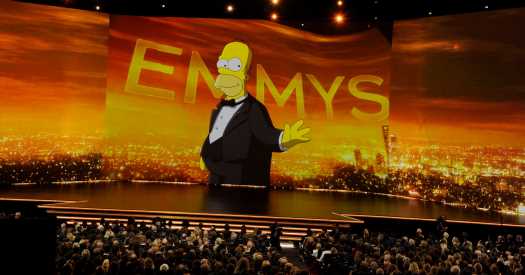For a few years now — three? five? — the most interesting thing about the Emmys broadcast hasn’t been the speeches or the gowns or even the awards themselves. It’s been the spectacle of broadcast television nervously, and a little desperately, dancing on its own grave.
That was true again Sunday night, when Fox gamely played host to a telecast in which all but two awards (both for NBC’s “Saturday Night Live”) went to cable networks or streaming services. (Just for good measure, Disney announced during the broadcast that pre-orders could be made for its Disney Plus streaming service.)
Like a three-hour magnifying glass, the Emmys show focuses the changes that are scorching the television business. What’s revealed is that no one’s sure what works at the moment. There’s more good TV (broadly defined) than ever, but it’s too multifarious, too out of control, for the old awards-show format, and no one’s found the answer yet.
So the best thing you can do is keep the show moving along, which Fox and the producers did, more or less. (How long will it be until the movie and mini-series category gets trimmed down, to speed the show’s long middle section?) They latched onto the idea of going without a host, which worked well for the Oscars this year, but they weren’t completely sure about it, so they opened with a labored sketch about the lack of a host. They came back and scratched the itch later in the show, with a slightly more amusing gag in which Stephen Colbert and Jimmy Kimmel deplored the no-host decision, before being replaced as presenters by the voice of Amazon’s personal assistant, Alexa.
Other tweaks to the broadcast were more straightforwardly unsuccessful, like the continually mystifying musical choices (are orchestras officially dead?) and Thomas Lennon’s strained and unfunny voice-over commentary, which had the virtue of being hard to hear. And while we’re probably lucky to be living in the post-production number era of Emmy telecasts, it would have been nice to see some more energy and invention put into the few “special” moments the show offered, like the tacky-looking in memoriam segment and the ruinously uninspired musical tribute to variety formats.

In the absence of a host, or any sense of a unified production, it was up to individuals to provide the highlights. Billy Porter — whose dramatic check-mark of a hat was a highlight in itself — brought the show alive with his exuberant acceptance of the drama lead-actor award for “Pose.” Patricia Arquette gave a touching, tearful tribute to her sister, the transgender actress Alexis Arquette, who died in 2016. Michelle Williams, accepting a lead-actress award for “Fosse/Verdon,” delivered a fierce call for pay equity for women. The presenters’ material tended to be overwritten and overly long, but crack performers like Bob Newhart and Maya Rudolph made it work.
The lack of a host also had the effect of making the mood in the room (the Microsoft Theater in Los Angeles) a stronger presence in the broadcast. You could feel the indifference, bordering on hostility, when Ben Whishaw won a supporting-actor award for “A Very English Scandal” over three nominees from the popular mini-series “When They See Us.” And moments later you could feel the swing to joy when Jharrel Jerome of “When They See Us” won for lead actor in one of the strongest Emmy fields you’ll ever see, beating out brilliant performances by Sam Rockwell, Hugh Grant and Mahershala Ali.
What was evident, as the show went along, was that the people making television — the Emmy voters themselves — were further along in decoding the new world of TV than the Television Academy or the award-show producers. Four awards, including best comedy, for Amazon Prime Video’s nervy, dirty, brainy “Fleabag,” rather than a valedictory send-off for a routine final season of HBO’s “Veep,” was the most exciting and significant development of the night. For that, you can put up with just about any amount of tawdry shilling for “The Masked Singer.”



Mike Hale is a television critic. He also writes about online video, film and media. He came to The Times in 1995 and worked as an editor in Sports, Arts & Leisure and Weekend Arts before becoming a critic in 2009. @mikehalenyt • Facebook
Source: Read Full Article
